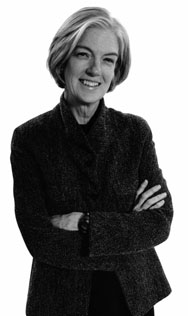A message from the chief executive
The extraordinary financial, economic and corporate events of 2008 recently led the Financial Times to publish a thought-provoking series of articles on 'The Future of Capitalism'. In it, some eminent commentators argue that the financial crisis is much more fundamental than the swing of the economic cycle; it's a breakdown of trust in financial institutions, in corporations, and in the idea of 'wealth creation' itself.
Pearson is a tiny part of that sweeping story, much of which is yet to be told. But this does seem to me an important time for us, and for companies of all sizes and types, to stop and think – and talk – about how we see the connection between our role in creating 'shareholder value' and our role in society and the definition of 'responsible business'.
For us, that definition starts with the kind of businesses we've chosen to be in. About a decade ago, we began a fundamental change of this company that had already endured for more than a century and a half before we came along. At the heart of that transformation was our view of the way the world was changing: it was becoming a so-called 'knowledge economy' where the success and prosperity of people and countries would depend more on their brain power than on their physical power.
In that world, we saw a growing demand and a pressing social need for education that was not just universally available, but was also universally effective for students of all ages, learning in many ways. (Our definition of 'learning', incidentally, isn't confined to the classroom or the lecture theatre: we aim to be an education company that serves the citizens of a brain-based economy whatever their circumstances – old or young, at home or at school or at work, in any pursuit, anywhere.)
That goal and our strategy to achieve it gives our company the opportunity to have an impact on society in our business itself. It's reflected in the support that our educational materials and technologies can provide to a teacher who's inspiring her class; in the kind of education that the FT has given its readers on the global financial crisis; or in the kind of intellectual stimulation that the Penguin Classics served to generations of readers.
The execution of our strategy centres on making all those kinds of learning both more effective (through new technologies, new products, new kinds of services) and more widely available (in new geographic markets and with new forms of digital distribution, for example). For more detail on how we're investing in and applying that strategy, please visit our annual report.
But our approach to business, and to our company culture, is also informed by our perception of our responsibility as a part of society. We think that's a fundamental part of our job, and we work on it through many avenues, including:
Our Pearson Code of Conduct. This is our simple and important statement about what we consider ethical and responsible behaviour in our company. We ask everyone to read this code a new every year, and to confirm that that's how they act, and how they see their company acting.
Our approach to the environment. This is a multifaceted plan to achieve 'climate neutrality' involving everything from planting trees and reducing our dependence on carbon-spewing elements from cars to factories to doing more to make our people aware of the threats we're trying to meet.
Our charitable work. The Pearson Foundation focuses its resources on the same thing Pearson does – education in the broadest sense of the word. But it goes about it a little differently. It works with non-profit organizations to create engaging after-school programmes for teenagers; to provide boxes and boxes of books to developing countries just opening schools and libraries; to help children who are victims of disasters and wars to carry on with their schooling.
Our aim to be a great place to work. We're determined to have a company populated by people who are always in demand, but who never want to leave Pearson because it's a stimulating, rewarding and flexible place to work that recognizes that 'employees' are not 'human resources' they're people, with families and pressures outside of work.
The insurance that we can continue to be a responsible company lies partly in all those actions, and partly in our financial strength and independence. That, too, is part of being responsible. This past year, for example, our financial headlines were:
Our Education Group profits are up 11% to £474m, with substantial growth in US Higher Education and International Education more than off setting weak market conditions for US School publishing;
The FT Group profits are up 13% to £195m, as growth of digital and subscription businesses and strong demand for premium content exceed decline in advertising revenues;
The Penguin Group's profits are up 4% to £93m with double-digit margins and strong competitive performance in a tough retail market.
Pearson made charitable donations totalling £7.7m (cash) this year, in addition to in-kind support.
We've achieved sustained growth and record results in the face of these turbulent times: our sales are up by 8%, our adjusted operating profit by 11%, and we had an increase of 7% in the dividend we return to shareholders each year.
We're proud of all those activities, and we hope you enjoy learning more about the min this report. But one of the defining characteristics of our company culture is that we are never satisfied. We'll be working hard to extend our impact in all those areas this year.

Marjorie Scardino
Chief executive

‘Our approach to business, and to our company culture, is also informed by our perception of our responsibility as a part of society. We think that’s a fundamental part of our job.’
Marjorie Scardino
Chief executive
- Further information
- Legal statement/Disclaimer
- Forward looking statements
- Accessibility
- Site map
- © 2009 Pearson plc
